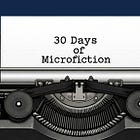Use Physicality to Power Up Your Verbs
Miniature writing lessons from my 100-word microfiction story, “Old Man Willow.”
Sometimes I look at a writing prompt and think, “What the hell do I do with this?”
That was my reaction to “willow,” the prompt that inspired my story, “Old Man Willow.” Try as I might, I couldn’t think of anything beyond how pretty the trees are. I just stared at the blinking cursor on my screen, nervously tapping the desk with my pointer finger, wondering how I could make the prompt fantastic.
Eventually, I did what any sensible writer would do: I turned to the Internet for inspiration.
Willow trees are often associated with sadness and grief, but they are also associated with happiness, all of which are represented in this story. In English folklore, there’s a more sinister legend where willow trees uproot themselves to follow travelers. While there is nothing sinister about this story, it does try to capture the whimsy of these folktales.
Funnily enough, weeks after writing this story, I had an odd realization that Old Man Willow is also a character from The Lord of the Rings. My brain was subconsciously channeling inspiration from Tolkien with me realizing it at the time (crazy how that works). You can read more about Tolkien’s version of Old Man Willow in the note I wrote below:
Anyway, here’s my analysis of “Old Man Willow,” one of my favorite microfantasy stories so far.
If you haven’t read the story yet, you can read it here (but make sure you come back for the Writer’s Note).
Strong Verbs Are Key
Ditch those weak verbs.
Word choice in microfiction makes all the difference, so whenever I can, I make an effort to use strong, powerful, active verbs.
The right verbs for the situation can make a big difference in the overall outcome and feel of a sentence. Think about it this way: What paints a more vivid picture in your mind, a dog that jumps over a puddle, or a dog that leaps over it? Is it more entertaining to picture a bird flying on a breeze, or a bird soaring on it?
In both examples above, the two verbs are functionally the same, yet have drastically different feels to them.
My favorite passage in this story, the final sentence, uses a ton of active language to showcase the difficulty with which Old Man Willow leaves his riverbed behind. Words like “split” and “wrenched” are loaded with power. Imagine how difficult it is to yank a tree out of the ground, then imagine the strength the old willow tree must have to uproot itself and walk away.
Again, I cannot emphasize enough the importance of using the right verbs in microfiction; when used well, they can create a sense of action and physicality that weak verbs cannot offer.
A Powerful (and Unexpected) Conclusion
Uprooting the audience’s expectations.
Have you ever wondered what a tree might have to say about the current state of the world?
The thought of silent, sentient trees–beings so old that they have watched the rise and fall of civilizations, the extinction of species, and the cruel march of time–is so interesting to me. If you could speak to a tree, what would it have to say? Would it think of humans affectionately, or would it hate humans for what they have done to the natural world?
This story was, in a way, inspired by Treebeard from The Lord of the Rings, as well as his anger, frustration, and rage against the atrocities of Isengard.
Just as Treebeard is affectionate and protective of the hobbits Merry and Pippin, Old Man Willow comes to love the humans who take shelter beneath his branches. And just as Treebeard feels anger, rage, and resentment over the atrocities committed by Isengard, so too does Old Man Willow as the humans drink from the poisoned river. I’ll never forget watching The Two Towers as a kid and witnessing the last march of the Ents as they uproot themselves and head off to war; man, what a powerful moment.
While he’s not marching off to war, Old Man Willow is leaving his beloved riverbed home behind in search of a better one.
Make the Explicit More Implicit
Knowing how and when to use exposition.
The writing center I used to work in had a saying: “Make the implicit explicit.”
This is great advice for writing instruction, when you have to make it clear what you expect from your students, as well as what they can expect from you as the instructor. Fiction writing is a bit different; while there are definitely times when exposition is necessary, sometimes a piece of writing benefits from more implicit storytelling. Sure, you could explain things clearly, but it’s important to acknowledge that there is a tradeoff involved with this decision.
The tradeoff in question: You’re robbing the reader of the opportunity to unravel the story for themselves.
There’s a line in “Old Man Willow” that I’ve never really loved, but still made it into the final version: “Humans paid him no mind, save the odd traveler.” I wanted to find a better way to show that the humans showed no regard for their natural surroundings, but never found the right words. I’m not sure if it would overcomplicate the story, but perhaps travelers could carve their initials into the old tree’s roots or something of the sort?
Or perhaps, in this case, it’s better to just state this fact and be done with it? I’m not sure.
In any case, I’ll let the reader be the judge of that.
The Last March of the Ents…?
Or the beginning of yet another?
Like many of my microfiction pieces, I feel like one or two more vivid details could work wonders for “Old Man Willow.”
Despite this, however, I’m pleased with the end result for this one. It tells a complex story of man versus nature and paints a picture of a vibrant setting with minimal actual description–something which, if you know me, takes real effort. That said, I think there’s room here for improvement, particularly in the realm of showing rather than telling.
What are your thoughts? What lessons did you learn from this piece of microfiction? Let me know in the comments.
As always, thanks for reading, and until next time… Keep writing!
Cheers,
Josh
🚨 P.S. Want to learn more about how to write microfiction? Check out my 30-Day Microfiction Challenge. 🚨










What are some of the lessons you've learned from this story? Did I miss anything? Be sure to let me know!